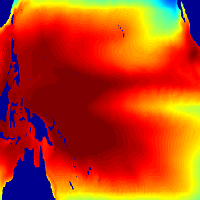Optimization and Uncertainty Quantification of Ocean Boundary Layer Physics
Previous Research
Involved: 
- Ibrahim Hoteit
- Fengchao Yao>
Description:
The objective of the project is to advance the ability of climate scientists and oceanographers to quantify uncertainties stemming from parameterizations of highly non-linear phenomena. In particular, we are working on developing an innovative strategy for quantifying uncertainties and improving the skill of the KPP (“K profile parameterization”) that is used to represent vertical mixing processes within surface boundary layer of the ocean (Large et al., 1994). Mixing processes represented by the KPP scheme are among the primary “gate keepers” that regulate the heat, momentum, and moisture exchange between the atmosphere and ocean. Slight variations in the effectiveness of these processes can have profound effects on coupled modes of variability such as the El-Nino/Southern Oscillation (ENSO) of the tropical Pacific and are an important source of uncertainty in climate projections of regional climate. These uncertainties also impact our ability to assimilate observations of the ocean state and hence the accuracy of seasonal climate predictions.
The research goal for this initial phase is to set up a metric of model skill that reflects scientific priorities and the limits of the data to define the limits of model acceptability. Subsequent years will use these results within a Bayesian statistical framework for identifying the optimal configuration of KPP that is consistent with observational constraints in its uncertainty. We will first focus on setting up a number of regional ocean modeling sensitivity experiments that can be used to interpret the effects of mixing processes as compared to observations within the tropical Pacific Ocean. This exercise will be important for building physical intuition for how the KPP mixing scheme works so that we can devise an appropriate metric for constraining parametric uncertainties during the later years of the project.
We will use the ensemble Kalman filter (EnKF) to quantify the limits of our ability to discern the effects of mixing processes from observational data. We will use these estimates as part of a likelihood measure of model fitness, an important step toward estimating a posterior distribution of parametric uncertainties. In effect these observational uncertainties help us quantify the statistical significance of discrepancies that occur between modeled and observed phenomena. These likelihood measures and use of EnKF sets our effort apart from the more traditional approaches that rely solely on individual parameter sensitivity experiments. While sensitivity experiments are helpful, what matters most to objective measures of modeling uncertainty are the limits imposed by the quality of the data and theories that underlie a given model.
- Charles Jackson (UT-Austin)
- Rob Scott (UT-Austin)/li>
- Armin Kohl (University of Hamburg)
- Patrick Heimach (MIT)
